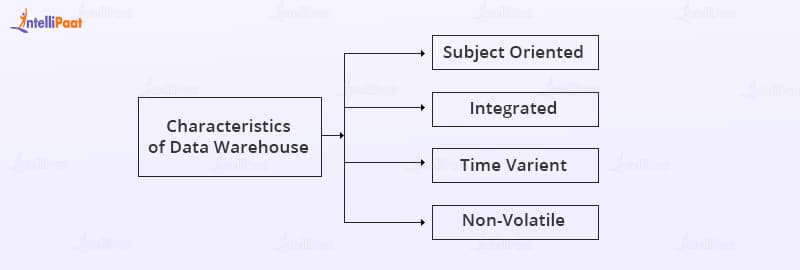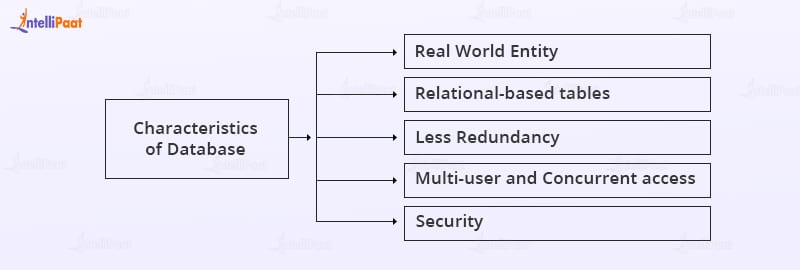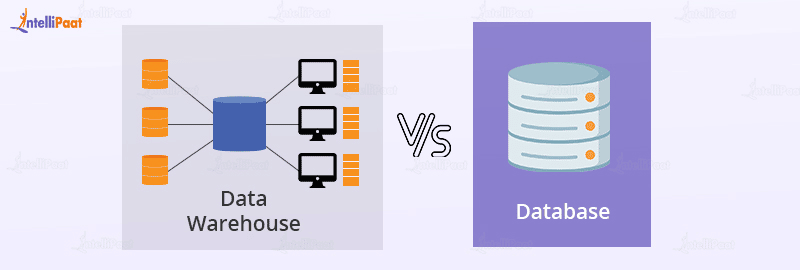Data Warehouse vs Database: Key Differences
A database consists of a collection of data. A database helps an organization carry out its basic functions. On the other hand, a data warehouse is a data reporting and analysis system. Provides high performance for analytical queries. Typically, the management of an organization uses a data warehouse.
So we are going to guide you right from the basics and will discuss in detail the topics which are mentioned below:
- What is a Data Warehouse?
- What is a Database?
- Characteristics of Data Warehouse and Database
- Data Warehouse vs Database: Differences
- Applications of Data Warehouse and Database
- Data Warehouse and Database: Which is better and why?
- Conclusion
Check this video on the Data Warehouse tutorial for a better understanding of Data Warehouse Concepts
What is a Data Warehouse?
A Data Warehouse is a storage of a large amount of operational data that documents the everyday operation of an organization, gathered from multiple sources stored under a unified schema at a single site. Various operational data are analyzed and connected in the data warehouse which is collected from different sources. Data warehousing is not just the data in the data warehouse, but also the configuration and tools to collect the queries and analyze the information also.
- The main concept behind data warehousing is that data stored for business can most effectively be accessed by separating it from data in the operational system.
- To execute complex analytical queries simply on large compound datasets, data warehouses are designed.
This Data Warehousing Certification provided by Intellipaat will help you master Business Intelligence concepts.
What is a Database?
A database is a systematic or organized set of related information stored so that it can be easily accessed, retrieved, maintained, and updated. You can organize data in table format and also in rows and columns in a database. With the help of data indexing, it becomes easy to retrieve any data whenever needed. All data is stored here as a library that stores different types of books in different genres. So think of the data like books in a library.
- On the World Wide Web, various sites are database driven.
- A database engine is used to make data accessible to users through a program.
- Oracle Database, MySQL, SQL Server, PostgreSQL, MongoDB, etc are examples of various databases.
- These modern databases are managed by Database Management System(DBMS).
Preparing for an interview? Check out these Top Data Warehouse Interview Questions to help you ace your interviews.
Characteristics of Data Warehouse and Database
Data Warehouse plays a very important role for an organization in analyzing their businesses because of the various characteristics, which are mentioned below:
Characteristics of Data Warehouse:

- Subject Oriented-
- The data warehouse is a subject-oriented database, which supports the different business needs of individual departments’ specific users.
- It intends to deal with any particular subject that is defined in a good manner.
- Integrated database-
- A data warehouse is a consolidated database that helps collect and consolidate data from various database sources.
- There are a limited number of methods for issues such as naming conventions, conflicts, units of measure, and inconsistent values.
- Time Variant-
- A data warehouse is a time-varying database that supports organizational management that analyzes business data and compares it against various time periods, such as yearly, quarterly, or specific dates.
- There are structured time limits between large data sets that are maintained for all online transaction processes.
- Non Volatile-
- A data warehouse is a non-volatile database.
- Data stored in the data warehouse cannot be changed or modified.
- Read-only mode is enabled so you can read data from your data warehouse and analyze it according to your organization’s needs.
Explore our Database Certification courses and choose your career path in the field of databases.
From the above points, you got to understand the various characteristics of data warehouses. Now, you will study the various characteristics of databases, these characteristics include:

Characteristics of Databases
- Real World Entity-
- Modern databases are more realistic and use physical entities to design their architecture as well as behavioral attributes.
- Relational-based tables-
- Database management system (DBMS) allows you to establish positions and relationships between tables.
- The user understands the database structure just by looking at the table names.
- Less Redundancy-
- These days databases have no redundancy.
- As because they follow normalization rules, it separates relationships when an attribute is too high.
- Security-
- Databases have security features such as multiple views that provide some level of security where users cannot access other users’ data.
- It has security features that allow users to have different views with different features.
- Multi-user and Concurrent access-
- It supports multi-user environments and allows users to access or modify data in parallel.
Want to dive deeper into Data Warehousing? Read this Data Warehouse Tutorial provided by Intellipaat.
Data Warehouse vs Database: Differences

| Data Warehouse | Database |
| Data warehouse stores historic data. | The database stores real-time data. |
| Data are stored based on Extract, Transform and Load processes. | Data are collected based on Application usage. |
| Data warehouse model types are:Virtual warehouseData MartEnterprise data warehouse | Database model types are:Hierarchical database modelRelational modelNetwork modelEntity-relationship modelDocument modelStar SchemaObject-oriented database modelEntity attribute value model |
| The data warehouse is a central platform for data storage that helps businesses to collect and integrate data from various operational sources. | The database is a traditional method of storing data in tables, columns, and rows, which allows data queries and processing easily. |
| Data warehouses are used for analyzing data and performance reporting. | Databases are used for capturing data, storing data, and supporting operational processes. |
| Data must be integrated and balanced from multiple processes. | Data is balanced within the scope of the process. |
| Data is updated in a scheduled manner. | Data is updated when a transaction occurs. |
| The data warehouse consumes data from all the databases and creates an optimized layer to perform data analytics. | The database is designed to be transactional and they are not designed to perform data analytics. |
| Schema is done or extracted from import. | Databases are structured with a defined schema. |
Applications of Data Warehouse and Database
Applications of Data warehouse:
- Amazon Redshift
- Snowflake
- Cloudera
- Microfocus Vertica
- Google BigQuery
- Amazon DynamoDB
Applications of Database:
- Oracle Database
- Microsoft SQL Server
- MySQL
- PostgreSQL
- MongoDB
- Redis
Want to get certified in SQL? Here is the SQL Training in Bangalore you are looking for.
Data Warehouse and Database: Which is better and why?
After all this discussion, we can say that database helps the company to carry out its core activities while the data warehouse helps the company to analyze its historical records.
Companies choose one of them based on their business needs. Each has features that support business performance or the ability to understand the needs of users.
Each has specific characteristics that help organizations overcome obstacles by using both solutions.
Career Transition
Conclusion
Data warehouses and databases are two different methods of storing data, with further impacts on time management, hardware expenses, and technical support needs. One of the main differences between them is that you can adjust each data record in a database, but you can’t add or remove records. And, data warehouses allow changes to particular records, and you can add new information, but you can’t remove it. Now you understand the difference between a database and a data warehouse and got to understand when to use them on what requirement. You need both database and a data warehouse according to the business needs.
Still, have doubts about Database or Data Warehouse? Start a conversation on our Community Page!
The post Data Warehouse vs Database: Key Differences appeared first on Intellipaat Blog.
Blog: Intellipaat - Blog
Leave a Comment
You must be logged in to post a comment.














